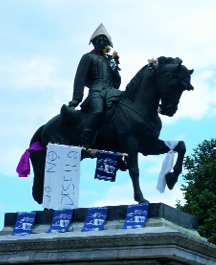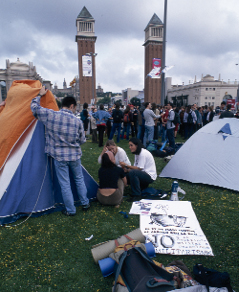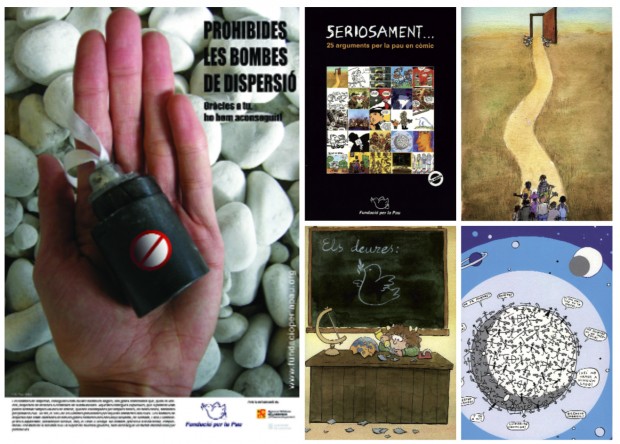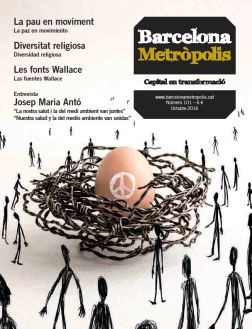The rejection of military service, peace education in schools and in the wider education offering available during leisure time, and anti-war demonstrations are some examples of this vitality, this heritage, that Barcelona and Catalonia treasure as a key to peace.

The monument to General Joan Prim in Parc de la Ciutadella, decked with pacifist symbols and slogans during the Festival per la Cultura de la Pau [‘Festival for the Culture of Peace] in May 2000.
Photo: Dani Codina
The case is an interesting one because the United States is not a signatory to the international convention banning cluster bombs, so the company has every legal right to produce and sell them. Why, then, is it ceasing to do so? By way of explanation, the company cites too many “legal problems” (the existence of the treaty has complicated the production process, even for countries that are not party to the convention) and “reduced orders”. Indeed, thanks to the treaty, fewer countries are using and purchasing cluster bombs, for which reason production volumes cannot remain the same.

An anti-military encampment in Plaça d’Espanya, that took place over the same dates. This action and the one in the previous photo were organised by a platform made up of over two hundred organisations to protest against a military procession taking place in Barcelona for the Día de las Fuerzas Armadas [‘Armed Forces Day’].
Photo: Dani Codina
It is possible, and indeed logical, to expect that certain deplorable situations such as Syria, Iraq, Afghanistan and Somalia, among others; the increase in the number of armed conflicts, the vitality of the arms trade, and so on, would lead us to believe that all is lost. However, even amid these very serious and troubling realities, complex and arduous peace agreements are being reached, for example in Colombia. Moreover, in recent years, there has been significant progress in the field of disarmament and arms control that we should be able to assess: the change that has occurred at the international level, and the fact that such changes are thanks, in large part, to the awareness-raising, education and mobilisation of citizens by means of NGOs, campaigns and organisations.
And in all these changes, Barcelona and Catalonia have played a role.
In fact, the rejection of military service, peace education in schools and in the wider education offering available during leisure time, and anti-war demonstrations are some examples of this vitality, this heritage, that this city and country treasure as a key to peace.
“Military service isn’t cool”
During the 1980s and 1990s, in democratic countries that had a conscription policy (compulsory military service) and the right to conscientious objection, a majority of young people did military service and a minority opted for objection.
Over the years, young people in Catalonia who did not do military service outnumbered those who did. That is to say, more young people were opting for alternatives (objection or disobedience) than to take the hand they were dealt. There were undoubtedly many factors behind this, such as the objection movement, the spread of anti-militarist feeling, political considerations and the Spanish State’s lateness and disorganisation in dealing with the issue of objection. Even so, from any perspective, it is a very important and little known fact.
As a result of the professionalisation of the Spanish armed forces, enlistment in the military became a voluntary process. That meant that, suddenly, the Spanish Government had to entice young people to enlist. The army’s image, very much eroded by the Franco dictatorship and the failed military coup of 23 February 1981, forced the Government to focus considerable efforts on recruiting soldiers.
Schools, scientists and parades
As a result of the foregoing and the uneasiness that many members of the military felt in view of the spread of anti-militarism in the 1980s and 1990s, the Spanish Government developed a programme to promote a “culture of defence”, with the aim of increasing the support and consensus of citizens towards Spanish defence policy, accepting the associated economic costs and taking a personal interest.
The plan was aimed at establishing a stronger relationship between the Spanish armed forces and the world of associations, youth organisations and teaching. Within the programme, schools were to offer subjects on defence, teaching centres were to become familiar with military life on the ground and military members were to visit these centres to speak about the professional avenues to becoming a soldier.
In that context, the Government also promoted Spain’s strong involvement in European arms industry projects: funding R&D projects relating to the military. The price for that policy is still being paid today in the form of staggering debt: around €30 billion was committed to the military industry. The OECD, which dedicated less money to R&D, went on to militarise quite a bit of this meagre spending.
It was clear that although military service had ceased to exist, militarisation was moving into other fields and forums: the worlds of teaching and scientific research.
That also gave rise to new campaigns and realities that, incidentally, emerged in Barcelona: the “Escoles Objectores” (Objector Schools) and “Prou investigació militar” (Enough with Military Research) campaigns. Two campaigns had a major impact and as a result, projects to militarise teaching and science were scaled down.
Barcelona also holds the honour of having hosted one of the most important protests – not only in Spanish history but also European – against a military parade.
In 2000, a festival and a major protest were held to reject a pro-military demonstration that was to include a military parade in Barcelona. Although few people are aware of it, those protests were the catalyst for the Spanish Parliament to pass the Peace Promotion Act and establish the Catalan Council for the Promotion of Peace and, in the future, the International Catalan Institute for Peace.

Poster from the Foundation for Peace, commemorating the signing of the Oslo Treaty (2008), which banned cluster bombs. On the right, cover and three pictures from the book Seriosament… 25 arguments per la pau en còmic [Seriously… 25 reasons for peace in a comic], published by the same organisation.
While in the beginning the campaign seemed doomed to failure, within five years it would achieve its major objective: a global treaty banning landmines, even though the major powers were clearly against it. Two years later, the agreement against cluster bombs would likewise follow.
In Barcelona, one campaign, the C3A (Campaign Against the Arms Trade), started to bring this trade into the spotlight in 1988. A few years later, the “Secretos que matan” (Secrets that Kill) campaign featured the involvement of NGOs beyond traditional pacifism. On a global scale, the Control Arms organisation called loudly for regulation of the global arms trade. Taken together, all these efforts achieved results, both at a state level and, ultimately, at a global level: a treaty to curb the lack of control and proliferation of the arms trade, a trade which is responsible for rendering hundreds of thousands of people victims of armed violence around the world.




Una molt bona feina i sovint massa desconeguda la de les ONG que traballeu amb temes de pau. Gràcies